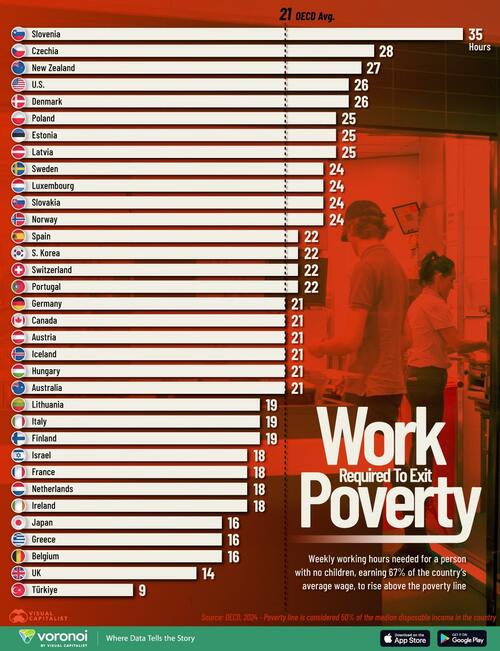In any given country, real wages, employment conditions, and economic opportunity often influence how easily people can overcome poverty.
Hence, rising above the poverty line requires a lot more work in some nations than in others, even between OECD countries.
This infographic, via Visual Capitalist’s Niccolo Conte, uses data from the OECD to shows the weekly working hours a single person (with no children) needs to work to rise above the poverty line in 35 OECD countries, assuming they earn 67% of the national average wage.
How Much Work Does It Take to Escape Poverty?
The poverty line is calculated as 50% of the country’s median disposable income. On average across OECD countries, a single individual with below-average income needs to work 21 hours per week to cross the poverty threshold.
However, there are stark differences between the countries at the higher and lower ends of the spectrum, as shown in the table below:
| Country | Weekly Working Hours to Exit Poverty |
|---|---|
| Slovenia 🇸🇮 | 35 |
| Czechia 🇨🇿 | 28 |
| New Zealand 🇳🇿 | 27 |
| United States 🇺🇸 | 26 |
| Denmark 🇩🇰 | 26 |
| Poland 🇵🇱 | 25 |
| Estonia 🇪🇪 | 25 |
| Latvia 🇱🇻 | 25 |
| Sweden 🇸🇪 | 24 |
| Luxembourg 🇱🇺 | 24 |
| Slovak Republic 🇸🇰 | 24 |
| Norway 🇳🇴 | 24 |
| Spain 🇪🇸 | 22 |
| South Korea 🇰🇷 | 22 |
| Switzerland 🇨🇭 | 22 |
| Portugal 🇵🇹 | 22 |
| OECD average | 21 |
| Germany 🇩🇪 | 21 |
| Canada 🇨🇦 | 21 |
| Austria 🇦🇹 | 21 |
| Iceland 🇮🇸 | 21 |
| Hungary 🇭🇺 | 21 |
| Australia 🇦🇺 | 21 |
| Lithuania 🇱🇹 | 19 |
| Italy 🇮🇹 | 19 |
| Finland 🇫🇮 | 19 |
| Israel 🇮🇱 | 18 |
| France 🇫🇷 | 18 |
| Netherlands 🇳🇱 | 18 |
| Ireland 🇮🇪 | 18 |
| Japan 🇯🇵 | 16 |
| Greece 🇬🇷 | 16 |
| Belgium 🇧🇪 | 16 |
| United Kingdom 🇬🇧 | 14 |
| Türkiye 🇹🇷 | 9 |
Slovenia stands out, requiring 35 weekly working hours—nearly the equivalent of a full-time job—just to move past the poverty line. Close behind are Czechia, New Zealand, the United States, and Denmark, each requiring between 26 and 28 hours per week to exit poverty.
Several developed nations are clustered around the OECD average of 21 hours, including Australia, Canada, South Korea, and European countries like Germany and Portugal.
Meanwhile, many countries require less than a typical part-time job’s worth of work (20 hours per week) to lift a low-income worker above poverty.
Türkiye notably requires just 9 weekly working hours to rise above the poverty line. This indicates that the country’s median disposable income is relatively low, with a few hours per week enough to cross the poverty line at lower-than-average wages.
Other countries requiring low working hours to exit poverty include the United Kingdom at 14 weekly hours, followed by Belgium, Greece, and Japan at 16 hours each.
To learn more about this topic, check out this infographic on Home Affordability in OECD Countries on Voronoi, the new app from Visual Capitalist.
Loading…


















